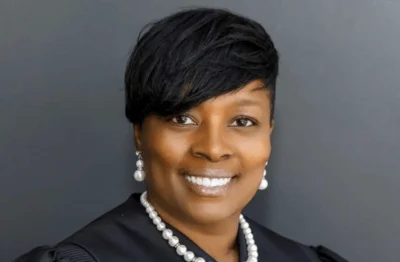U.S. District Judge John Kness presides over the wrongful conviction case.
U.S. District Judge John Kness presides over the wrongful conviction case.
A key witness in the 1993 murder of college basketball start Marshall Morgan Jr. was pressured by a gang member to recant his testimony, and that evidence should be allowed in a civil trial brought by two men later exonerated of the crime, city attorneys argued in a motion recently filed in federal court.
In the case, witness Jody Rogers implicated Tyrone Hood and Wayne Washington in the shooting death of Morgan, whose body was found wedged between the front and back seats of his mother’s car on South Michigan Avenue. Rogers later recanted, and Washington and Hood, who claimed that city detectives coerced them into confessing, had their convictions vacated in 2015. In 2016, the two sued for wrongful conviction in U.S. District Court for the Northern District.
“The reason Jody Rogers recanted his statement to police will be a hotly contested issue at trial,” city attorneys argued in the motion, “and the gang evidence, which includes the attempts to intimidate Jody through threats and physical abuse, are central to resolution of that issue.”
In an earlier motion, attorneys noted that at the time of the Morgan murder Washington was "undeniably a member of the Black P Stones or ‘Blackstones’" street gang.
Rogers, the motion stated, recanted his testimony because he and his family were threatened by a member of Washington’s gang. Rogers was subsequently beaten in Cook County jail before Washington’s criminal trial.
In a twist to the case, it was James Mullinex, Hood’s lawyer in the murder trial, who in 1994 made “unannounced visits,” to Rogers, according to city attorneys, and “obtained Jody’s signature on a handwritten statement and a typed statement, in which Jody recanted his statement to police and accused police of misconduct.”
Mullinex was later a commissioner on the controversial Torture Inquiry and Relief Commission (TIRC), a 2009 creation of the state legislature that investigates cases where confessions were allegedly derived through police torture.
The commission has been criticized by the families of victims, law enforcement, and some in the legal community for what they claim is a lack of transparency and aggressive, unconstitutional use of extraordinary judicial powers.
On TIRC’s recommendation, a spate of convicted murderers have been set free – cases where no new evidence was presented indicating the innocence of those convicted of the crimes. Some of the crimes go back decades, and witnesses, critics note, are deceased or no longer willing or able to give reliable testimony. Detectives are retired and reluctant to testify in cases in which TIRC commissioners have already determined police misconduct may have taken place.
In 2015, for instance, TIRC recommended the reopening of the case of Jackie Wilson, who was sentenced to life without parole for his role in the 1982 murders of police officers Robert O’Brien and William Fahey. Wilson claimed he was tortured into confessing.
In 2018, a judge ordered Wilson released on bond. Prosecutors appealed the ruling but in December 2019, the Illinois Appellate Court upheld the decision.
In 2021, Wilson sued in federal civil court for wrongful conviction. One of those named in the lawsuit was former prosecutor Lawrence Hyman. Hyman’s attorney, Ed Theobald, who has over 30 years of trial experience, filed a motion in the case questioning TIRC’s very constitutionality.
Theobald argued that nothing in the Illinois Constitution gives TIRC the power to recommend the release of a convicted murderer. That authority is granted solely to the governor.
At the same time, Theobald’s motion launched a broadside against Illinois Attorney General Kwame Raoul, who, as a state senator, sponsored the legislation that created TIRC.
Theobald wrote: “Instead, both Jackie Wilson and Kwame Raoul have offered no constitutional rationale explaining how an administrative agency under the Executive Branch, appointed by the Governor, could create a re-do after Plaintiff Jackie Wilson was found guilty in two separate murder jury trial convictions by Illinois Courts. Under the Illinois Constitution, the Illinois Governor is the only Illinois Executive who can rescind or vacate final orders of the Judiciary, not Jackie Wilson’s criminal defense lawyers serving as the Director of TIRC or others not empowered by the Illinois Constitution of 1970.”





 Alerts Sign-up
Alerts Sign-up